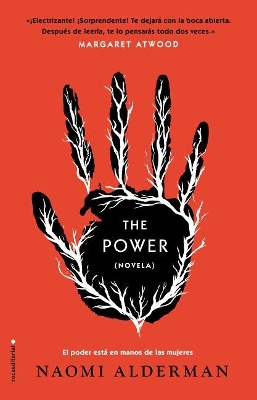Reviewed by clq on
I'm really conflicted about this book. I have a bunch of problems with it, but the problems are mainly rooted in my expectations of it.
Through various things I'd read about The Power I expected it to be a "What would the world look like if women were physically superior to men" kind of story, in a thought-provoking "See how shocking and unusual this looks when the genders are reversed?" kind of way. The book has elements of this - quite a lot of them - but ultimately this is not what the book is. I can't say much more about exactly how the book wasn't what I expected without spoiling anything, so I won't, but suffice to say I expected it to be a bit more explicitly feminist than it comes across, and it would have been interesting to read a story with this premise that was a feminist message with a story, rather than a story which was heavily feminist. That said, there are a few great, and genuinely thought-provoking passages on gender-role-reversal, but as brilliant they are, they seem almost a little out of place in a book where I really wish they didn't.
So, that's the "this book wasn't what I expected it to be" part over with - on to the book itself!
Despite the story not being interesting for the reasons I was expecting, it is still a very interesting story, and while it is, in a sense, all about gender, the story as a whole reads like a story of what can happen when the balance of power shifts from one group to another. In the context of the main story the fact that gender is the axis around which the power has shifted seems almost incidental. The book shows the discovery of the power, and how the world gradually adjusts - or doesn't - to the new status quo.
My problem with the story is that some of the characters we follow, and the actions they take, just don't seem viable. I'm perfectly happy to accept the premise of the book, but in a story where it seems like it would have been possible to make the characters entirely convincing, some of the actions that drive the story forward just don't seem viable to me. In a sense this is a compliment to the story: the reason I found it annoying at times was that I felt like the book was so close to getting this right. I feel that there are things that we could have learned about the characters, and some more nuance added to what they ended up doing, that could have made it all seem so much more viable without the story having to change.
Once I got into the book a little more, and got used to the way in which this story was going to be told, I started quite enjoying it. It didn't get everything exactly right for me, and quite a few times I felt like certain scenes could have gone on for longer. When the pace slowed down it could have reveled a little more in the quiet, and spent longer exploring the emotion that was present in many of those moments. When it became brutal (and at times it becomes quite brutal) I think it could have taken the brutality further. It really did stick the knife in, but I think it could have twisted the knife around, and been more explicit about some of the horror that the reader knows took place, but that remained between the lines. I think it would have suited the book to be more gratuitous, and not hold back at all, in some of the places where the horrific and uncomfortable nature of what was happening was the point of the scene.
I'm really struggling with the rating of this book. Had I gone into the story completely blind, I think I would have given it four out of five, and objectively I think that's what it probably deserves. However, as I try to rate all the books based on my subjective experience of it, I have to give it a three. I'm very happy to have read it, it was occasionally thought-provoking in a way where I felt my thoughts benefited from being provoked, and it's a really interesting read.
Reading updates
- Started reading
- 31 May, 2019: Finished reading
- 31 May, 2019: Reviewed

